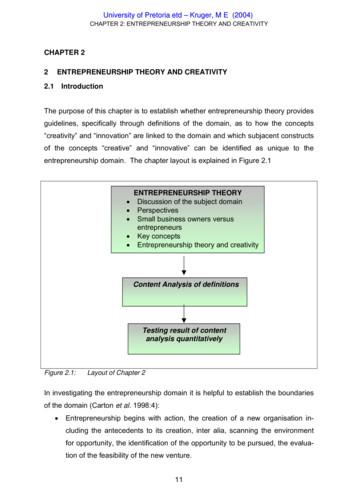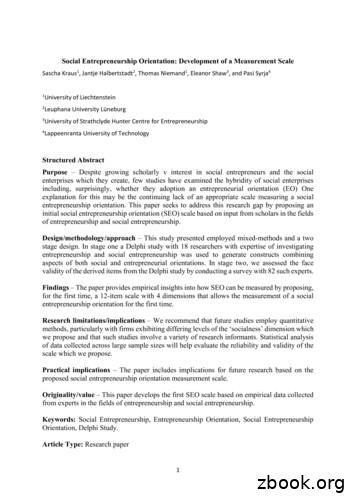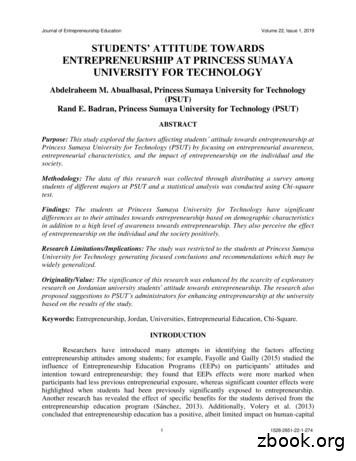Unit 1 Entrepreneurship An Introduction-PDF Free Download
To define the entrepreneurship. To explain the significance of Entrepreneurship. To explain the Entrepreneurship Development. To describe the Dynamics of Entrepreneurship Development. 1.1 Need and significance of Entrepreneurship Development in Global contexts It is said that an economy is an effect for which entrepreneurship is the cause.
Unit 2: Understanding the modern concept of entrepreneurship 19 Unit 3: Psychological Approach to Entrepreneurship 33 Unit 4: Socio-Economic Approach to Entrepreneurship 38 Unit 5: Business Expansion and the Changing Role of the Entrepreneur 44 Module 2
774A Unit 11 · Entrepreneurship and Finance Entrepreneurship and Finance PLANNING GUIDE AND RESOURCES Print Digital Unit 11 Entrepreneurship and Finance Unit 11 Fast Files: Marketing Internship Project Activity Connect Online Learning Center through glencoe.com Chapter 33 Entrepreneurial Concepts Student Activity Workbook: Chapter 33 DECA .
CHAPTER 2: ENTREPRENEURSHIP THEORY AND CREATIVITY ctives. epreneurs. reneurship. 3:49). thought on the meaning of entrepreneurship. One group focused on the characteris-tics of entrepreneurship (e.g. innovation, growth, uniqueness) while a second group focused on the outcomes of entrepreneurship (e.g. the creation of value).
identify and describe characterizations of technology entrepreneurship, digital techno-logy entrepreneurship, and digital entrepreneurship. With this new delineation of terms, we would like to foster discussion between researchers, entrepreneurs, and policy makers on the impact of digitization on entrepreneurship, and set a future research agenda.
Digital entrepreneurship is the phenomenon associated with digital entrepreneurial activity. While the expressions ‘ICT entrepreneurship’ and ‘digital entrepreneurship’ are widely used, we have opted to use only the expression ‘digital entrepreneurship’ in this
Academic entrepreneurship: time for a rethink? 9 As academic entrepreneurship has evolved, so too must scholarly analysis of academic entrepreneurship. There has been a rise in scholarly interest in academic entrepreneurship in the social sciences (e.g., economics, sociology, psychology, and political science) and several fields of business
Global Entrepreneurship Education II- FRAMEWORK TABLE 1: CASES BY LEARNER CATEGORY III- ENTREPRENEURSHIP EDUCATION IN CHINA The Maker Space of Tsinghua University High School: Extreme Learning Process (XLP) For Entrepreneurship Education Tsinghua x-lab: a University-based Platform For Creativity, Innovation and Entrepreneurship Education
Entrepreneurship Development and Management, Vasant Desai, HPH 2. Entrepreneurship Management, Bholanath Dutta, Excel Books 3. Entrepreneurial Development, Sangeeta Sharma, PHI 4. Entrepreneurship, Rajeev Roy, Oxford University Press. CONTENTS MODULE I – ENTREPRENEURSHIP 1. The Concept
To define corporate entrepreneurship, initially the term entrepreneurship must be defined. Secondly, it is important to define clearly what entrepreneurship in established companies means. The main problem with the preparation of scientific papers regarding entrepreneurship is the concretization of a conceptual framework (Shane & Venkataraman .
2. Corporate entrepreneurship Even if the concept of Corporate Entrepreneurship already has a few decades, the definition of the phenomenon of Corporate Entrepreneurship is far from making the unanimity of the authors. Burgelman identify that corporate entrepreneurship refers to the process whereby the firms engage in diversification
entrepreneurship orientation. This paper seeks to address this research gap by proposing an initial social entrepreneurship orientation (SEO) scale based on input from scholars in the fields of entrepreneurship and social entrepreneurship. Design/methodology/approach - This study presented employed mixed-methods and a two stage design.
3. Determining the major factors that affect the students' attitude towards entrepreneurship at PSUT through three major factors: students' awareness towards entrepreneurship, students' perception towards the effect of entrepreneurship on the individual, and students' perception towards the effect of entrepreneurship on the society.
This is "Global Entrepreneurship and Intrapreneurship", chapter 11 from the bookChallenges and Opportunities in International Business(index.html)(v. 1.0). . Who is an entrepreneur, and what is entrepreneurship? 2. What do entrepreneurs do? 3. What is entrepreneurship across borders? 4. How does entrepreneurship lead to global start-ups?
CENTRE FOR ENTERPRISE AND ENTREPRENEURSHIP STUDIES, CENTRAL UNIVERSITY OF TECHNOLOGY, FREE STATE THE SECOND INTERNATIONAL CONFERENCE ON ENTREPRENEURSHIP DEVELOPMENT (ICED) 2019 Theme: Sustainable entrepreneurship development for the 4th Industrial Revolution Conference Chair: Professor Dennis Yao Dzansi Professor of Entrepreneurship
human capital entrepreneurship articles published in these top-tier mainstream manage-ment journals. Within the entrepreneurship journals, human capital entrepreneurship research was relatively consistent from its initiation through 2006. In 2007, Entrepreneurship Theory and Practice published an eight-article special issue focusing on human .
What is entrepreneurship? Students will be able to: a. Define and give examples of entrepreneurship. b. Draw conclusions as to what they can expect to learn in a course called "Entrepreneurship and Business". c. Explain why entrepreneurship is so important to the United States economy. Readings G pp. 4-7, 15, 17-21, SW pp. 3-6
Trigonometry Unit 4 Unit 4 WB Unit 4 Unit 4 5 Free Particle Interactions: Weight and Friction Unit 5 Unit 5 ZA-Chapter 3 pp. 39-57 pp. 103-106 WB Unit 5 Unit 5 6 Constant Force Particle: Acceleration Unit 6 Unit 6 and ZA-Chapter 3 pp. 57-72 WB Unit 6 Parts C&B 6 Constant Force Particle: Acceleration Unit 6 Unit 6 and WB Unit 6 Unit 6
Entrepreneurship - Incorporation of Business - Forms of Business organizations - Role of Entrepreneurship in economic development - Start ups. 1.1.Definition and introduction The concept of entrepreneurship has a wide range of meanings. On the one extreme an entrepreneur is a person of very high aptitude who pioneers change, on the .
SYLLABUS Class: - B.B.A. IV Semester Subject: - Entrepreneurship UNIT - I Introduction to Entrepreneurship Definition of Entrepreneur, Entrepreneurial Traits, and Entrepreneur vs. Manager, Entrepreneur vs. Entrepreneur. The Entrepreneurial decision process. Role of Entrepreneurship in
Paul Miesing, "Introduction to Social Entrepreneurship" Summarize key principles of social entrepreneurship Identify the challenges and opportunities of social entrepreneurship Use evidence to analyze, evaluate, and exploit a social opportunity for an entrepreneurial venture Apply business functions to create and sustain a social
4 KING'S BUSINESS SCHOOL Entrepreneurship and Covid-19 KING'S BUSINESS SCHOOL Entrepreneurship and Covid-19 5 Introduction Entrepreneurship is important to the UK economy. There were 5.86 million small and medium-sized enterprises (SMEs) at the start of 20192, who provided employment to 16.6 million people (60 per cent of all private sector employment)
Entrepreneurship is a mindset—a way of looking at things that is opportunity-focused and creative. It's . This course provides an introduction to, and an overview of, the fundamentals of entrepreneurship. . Fundamentals of Entrepreneurship Spring 2020 Syllabus W - 6:00 PM - 9:30 PM (JFF 416); Sec6on: 14362R Units: Professor: 4.0
productive entrepreneurship scholars of all time) draws a few too-strong inferences from the evidence he adduces, the book is a good introduction to some recent facts and fantasies about entrepreneurship. The digital version of the book is available inexpensively. Shane, S. 2010. The Illusions of Entrepreneurship: The costly myths that
INTRODUCTION An important trend in entrepreneurship research is an increased interest in a more contextualized understanding of entrepreneurship. Zahra (2007:445), for instance, argued that . entrepreneurship in the agricultural sector as shown in Figure 1, which illustrates our framework. Accordingly, one axis of our organizing framework .
BASIC WIRING TABLE OF CONTENTS Unit I: Occupational Introduction 1 Unit II: General Safety 15 Unit III: Electrical Safety 71 Unit IV: Hand Tools 101 Unit V: Specialty Tools and Equipment 195 Unit VI: Using Trade Information 307 Unit VII: Basic Equipment 343 Unit VIII: Basic Theory 415 Unit IX: DC Circuits 469 Unit X: AC Circuits 533 Unit XI: Wiring Methods 641 Unit XII: Conductors 685
entrepreneurship; the Global Entrepreneurship Monitor (2005) defines it as creation of a new business venture, both formal and informal; and Acs and Szerb (2009), who created the Global Entrepreneurship Index, define it as a dynamic interaction of entrepreneurial attitudes, activity, and aspiration that vary across stages of economic development
4 KAUFFMAN INDICATORS OF ENTREPRENEURSHIP EXECUTIVE SUMMARY Executive Summary The Kauffman Indicators of Early-Stage Entrepreneurship is a set of measures that represents new business creation in the United States, integrating several high-quality, timely sources of information on early-stage entrepreneurship.
entrepreneurship education in order to teach to their students through experimental methods (Gustafsson-Pesonen & Remes, 2012). In this sense, it can be said that the studies conducted regarding entrepreneurship education in teacher training are very important in informing teachers and educators about entrepreneurship education.
ENTREPRENEURSHIP EIGHTH EDITION ROBERT D. HISRICH.PhD Garvin Professor of Global Entrepreneurship Director, Walker Center for Global Entrepreneurship Thunderbird School of Global Management MICHAEL P. PETERS, PhD Professor Emeritus Carroll School of Management Boston College DEAN A. SHEPHERD, PhD Randall L. Tobias Chair in Entrepreneurial .
entrepreneurship theory in a country will also be “good” in another country. The purpose of this study is to indicate that there is an absolute effect of culture on entrepreneurship, and entrepreneur reflects dominant values of his or her national culture; therefore, some countries’ entrepreneurship is lower compared to other countries.
15. Delivering on the Promise of Social Entrepreneurship: Challenges Faced in Launching a Global Social Capital Market 329 Pamela Hartigan 16. Social Entrepreneurship: The Promise and the Perils 356 Jerr Boschee 17. Moving Ahead Together: Implications of a Blended Value Framework for the Future of Social Entrepreneurship 391 Jed Emerson .
Digital entrepreneurship Digitization makes entrepreneurship less space-/cluster-bound (Autio et al., 2017) Intersection of digital technologies and entrepreneurship (Nambisan, 2016) less bounded entrepreneurial processes and outcomes (generativity & scale) less predefined locus of entrepreneurial agency Platform companies like Amazon as
for digital health entrepreneurship in Vietnam, to interview entrepreneurs and policymakers, and to synthesize my research into recommendations to incentivize and scale up healthcare entrepreneurship. As I explain in this paper, digital health entrepreneurship in Vietnam is miniscule with only 7 million in funding in 2019.1
Digital entrepreneurship is a sub group of entrepreneurship which involves digitalization methods in the functioning of its activities. Hence, digital entrepreneurship is related to digital business activities along with some digital goods and services (Clyde Hull, 2006).
disruptive technologies of the digital era have increased the speed of innovation and created new ways of performing entrepreneurial activities (Thukral et al., 2008; Yoo et al., 2012). Digitalization has allowed digital entrepreneurship to emerge. Digital entrepreneurship has changed the way in which we view entrepreneurship.
ment). (Total tuition time: not available) ENTREPRENEURSHIP III (ETR316D) 1 X 3-HOUR PAPER (Module custodian: Department of Management and Entrepreneurship) The module integrates entrepreneurship and business management skills within a South African business development, growth and network context (business implementation).
to universities’s role in the implementation of entrepreneurship education. University needs to apply a concrete entrepreneurship learning pattern based on empirical input to equip college-students with meaningful knowledge in order to encourage college-students’ spirit in entrepreneurship (Suharti & Sirine, 2011).
Almost without exception, academic studies on entrepreneurship are motivated by the economic benefits of entrepreneurship. Most studies refer to one or two academic studies showing that entrepreneurship indeed
Social Entrepreneurship and Government 3 problems4—has received in recent years. The field constitutes a new breed of entrepreneurship that exhibits characteristics of nonprofits, government, and businesses—including applying to social problem solving traditional, private-sector entrepreneurship







































